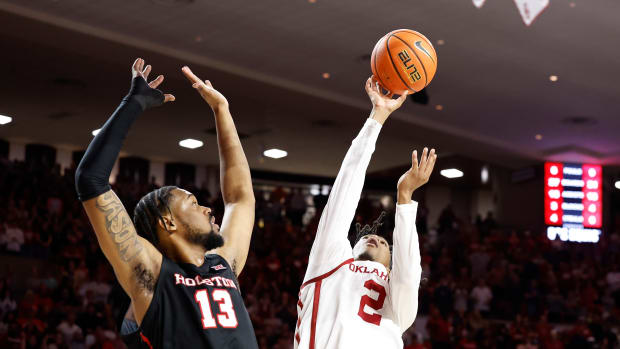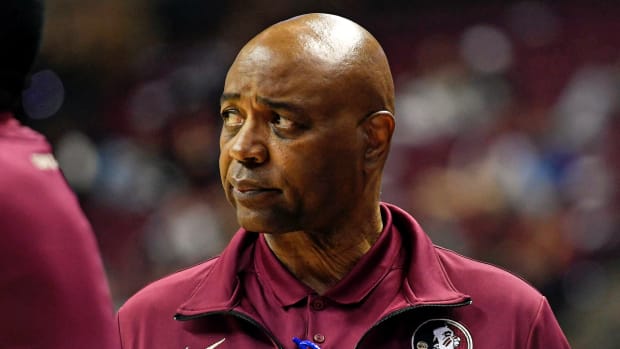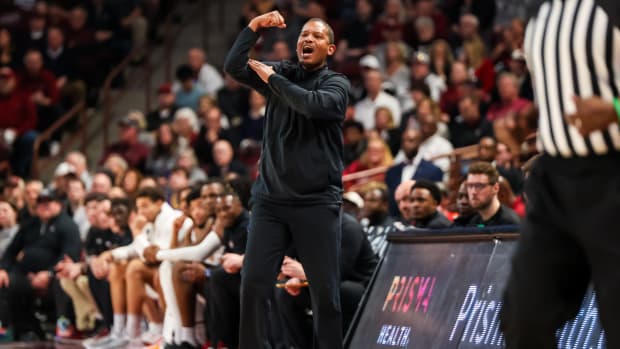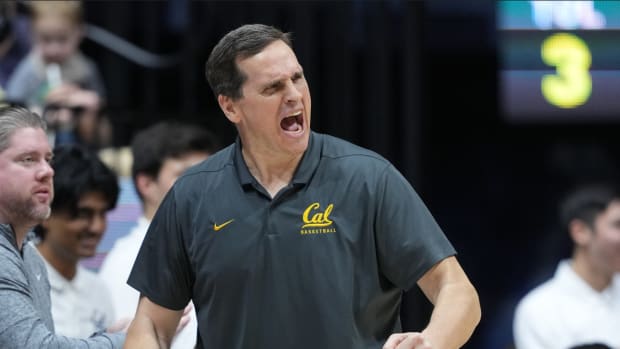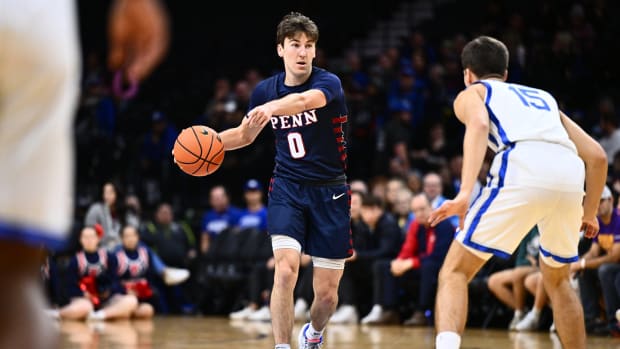How Florida Found Its Way Back to the NCAA Tournament
Around once a month throughout the regular season, Florida coach Kelly Rae Finley carved out time for her team to gather and, at least for a few minutes, not think about basketball. In November, for instance, while at the San Juan Shootout, everyone traveling with the program—from players to managers to support staff to the radio broadcasters—pulled the name of another person at random and was asked to write something they appreciated about them. They then exchanged note cards.
In February, the team met again, this time in the film room, and wrote down something they were thankful for and read it aloud in front of one another. “I believe that gratefulness needs to be trained,” Finley says.
Adds senior guard Zippy Broughton: “I think the little things like that are a huge reason why teams can bond and be successful.”
In Finley’s debut campaign, Florida has undergone a revival. It beat five ranked opponents for the first time since the 2005–06 season. And UF’s 21 wins are the school’s most since ’15–16. On Saturday, the No. 10 seed Gators will return to the NCAA tournament for the first time in six years and meet No. 7 seed UCF in the first round.
One of Finley’s mentors, longtime Harvard coach Kathy Delaney-Smith, says, “Coaching is relational.” It’s a philosophy that the 36-year-old Finley works to manifest, and one that has been especially important this year.
Last July, then Florida coach Cam Newbauer resigned after four seasons with the program; a school-issued statement said the decision was made for personal reasons. In the fall, though, the university’s student newspaper, The Independent Florida Alligator, and ESPN, both reported accounts that Newbauer had been verbally, emotionally and physically abusive to his players. By then, Finley, who was initially hired as an assistant in 2017, was a few months into her tenure as the school’s interim head coach.
Finley has already made her mark on the program. “The care that the team has for the game now, I think it’s way different for us,” senior guard Kiki Smith says.
Key to that added commitment is their coach’s concerted efforts to relate with her players on a personal basis. “When you can connect with each of us on a different level, it’s very special,” Smith says. “When you trust a person, you don’t want to disappoint them and you can see that’s how it is with the team now.”
“[She’s] put Florida back up at the top,” Florida alumna and radio broadcaster Brittany Davis says.
The Gators have shown resilience throughout the year. Entering March Madness, why should they stop believing now?
Broughton was pissed, and her coach knew it. On Dec. 1, Florida lost to George Mason, 75–71, falling to a team that would finish last in the Patriot League. The senior guard, who is in her first year with the Gators after transferring from Rutgers, played only eight minutes in the defeat, which dropped Florida to 6–3 on the season. So that night she texted Finley asking to meet the next day.
When Broughton entered the room heated, she recalls being immediately mellowed out by Finley’s tone of voice. The senior’s central question—“What do I need to do to play more?”—was met with a clear, concise response.
“You need to be more consistent,” Broughton recalls Finley telling her.
Throughout the year, Finley worked with Broughton to ensure her feedback wasn’t brushed aside. The two would spend added time in the gym, film room and Finley’s office. “She’s big on having a conversation before anything,” says Broughton, who averaged 10.5 points and 3.9 rebounds per game this season. “I’m grateful to have a coach, and a person, in my life that I’m comfortable having those conversations with.”
Creating spaces to be vulnerable has been a theme for the program. Ten days before the regular season opened, AllGators.com published a report in which a former UF player shared further accounts about Newbauer and said Finley also “swept” issues “under the rug.” Soon after, according to multiple people in attendance, the team met in its locker room, where, as one player in attendance put it, “People were able to speak on it as they felt. People were able to get the weight off their shoulders.”
When asked about reports involving Newbauer, Finley told SI, “I’m not going to talk about anything about the past. … I have already addressed that. Our program has addressed it. Our student-athletes have.”
The university said in a statement this fall regarding Newbauer that there “were concerns brought” to its attention. But, it added, “Each time, additional information was sought, and these concerns were addressed directly with Cam as we required corrective actions and outlined clear expectations of behavior moving forward.
“Ultimately, we did not see the required improvements, and following discussions with Coach Newbauer he made the decision to resign.”
The group hasn’t formally discussed the accounts of the former players since that October conversation. Through the team’s multiple preseason conversations on the matter, a mantra had also emerged: We’re all we got. We’re all we need.
On Jan. 9, Florida faced Texas A&M in College Station, staring down the most difficult part of its schedule with its then leading scorer, Lavender Briggs, having been ruled out for the season with a stress fracture in her lower leg. (Briggs would transfer days later to Maryland.) They had entered SEC play at 10–3 but dropped its first two conference games to Georgia and Ole Miss, their season reaching a key juncture.
With 4:19 to play in the third quarter, the Gators trailed the Aggies by 19. There was no grand speech that sparked a Gators comeback, however. Instead, Finley recalls a freedom in how her team played from that point forward, and “the look in our student-athletes’ eyes. … This look of we’re going all in, and we’ll live with whatever the outcome is.”
Florida slowly clawed its way back, trailing by only nine at the end of the third. Led by Smith and Broughton, who combined for 55 points, the Gators emerged victorious in double overtime, setting off a locker-room celebration full of splashing water and joyous hugs.
Other victories soon followed. Four days later they toppled Auburn, then Alabama, then Kentucky and then LSU. They would lose only once more—on Jan. 30 against top-ranked South Carolina—before their trip to Baton Rouge on Feb. 20, by that point having moved into the AP top 25 for the first time since 2016.
“A big reason why I chose here was because I seen this team as a very talented team that just was underachieving in the SEC,” Broughton says.
It was clear by regular season’s end that a sleeping giant in the conference had woken up.
Finley rattles off the eye color of her players with ease. Smith has brown eyes. So does Broughton. Sophomore forward Floor Toonders has blue eyes. Freshman guard Alberte Rimdal does, too.
Such facts may seem trivial, but to the Florida coach, they also underscore an important way in which she connects with her players: through eye contact. “Sometimes, she don’t even have to tell me anything,” says Smith, who averaged 14.6 points, 5.5 rebounds and 4.6 assists per game this season. “She’ll just look at me and I’ll be like, ‘Kelly, I know.’”
Finley has two younger siblings. One is her sister Brooke, who is five years her junior. Brooke has Rett syndrome, a rare neurological and developmental disorder that Finley says prevents her sister from speaking and using her hands. They connect via touch and eye contact to communicate their thoughts and emotions.
Finley credits her relationship with Brooke for shaping so much of who she is and her desire to foster strong individual connections. Her Florida players see the clear link.
“Her patience and her willingness to understand us beyond the scope of being just basketball players, that’s her greatest asset,” Broughton says. “Just seeing us as humans first, as women and not just athletes.”
As Florida stormed up the SEC standings, Finley dismissed questions about whether and when she would have the interim tag lifted from her title. She said instead her focus was solely on her players.
Then, on Feb. 28, three days before their SEC tournament opener, Florida athletic director Scott Stricklin surprised the team with news that Finley had been promoted to the permanent role, signing a five-year contract worth $3.7 million. Players hugged their coach and took selfies, rejoicing in the locker room.
Her bonds were also clear days later, during UF’s SEC tournament matchup with Vanderbilt, when Smith crumbled to the floor with 4:16 to play in the game, her right knee buckling as she stopped to throw a bounce pass to forward Jordyn Merritt. “My tears are not about disappointment,” Finely told reporters afterward. “It’s that your heart aches when you care so much about each other.”
Smith will miss the rest of the season due to the injury, lowering Florida’s tournament ceiling. The Gators likely would have been a higher seed had their star guard not been ruled out.
Smith said before her injury that her team’s resilience is what she is most proud of. Now without one of their on-court leaders, Florida will be forced to rally again.
“I’m just inspired by them,” Finley says. “I’m just really grateful for the time that we’ve had to spend together.”
More College Basketball Coverage:


